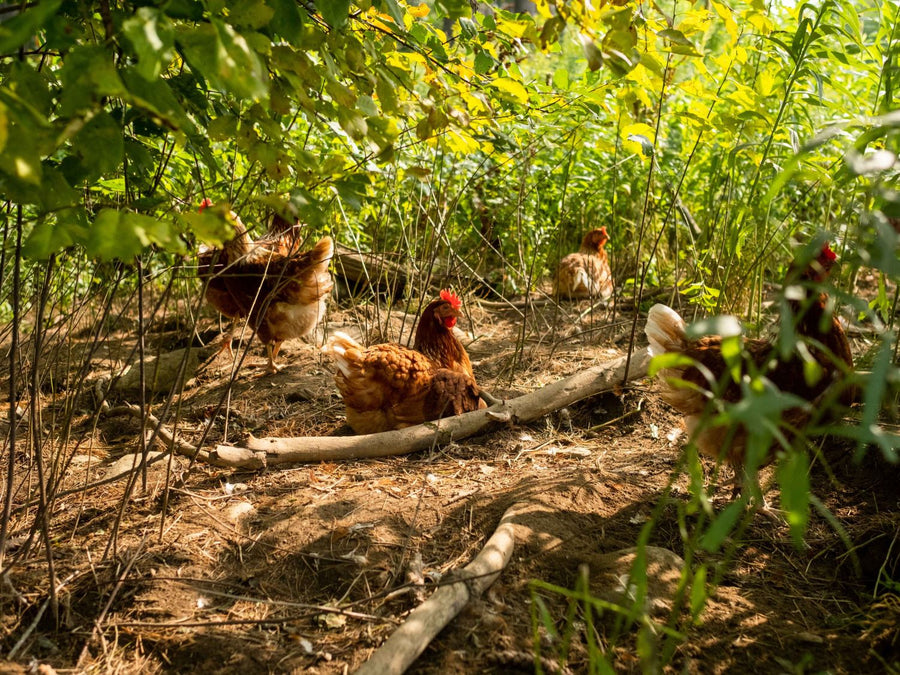
Seeking Sustainable Eggs? Here’s What to Know Before You Go to the Grocery Store!
Picture this: it's a sunny Saturday morning, and you’re whipping up a delicious breakfast for your family. As you reach for the egg carton, you might wonder: are these eggs as good for the planet as they are for my family? At Pete & Gerry’s, we believe you deserve transparency and clarity when it comes to the food you put on your table. So, let’s explore what makes eggs truly sustainable and empower you to make informed choices during your next grocery run or Instacart order.

Are Eggs a Sustainable Food? How Egg Farmers Influence the Big Picture
We often talk about the ethical implications of humane egg production, but the environmental impact is just as significant. Choosing responsibly produced eggs can make a real difference for the planet. Here's how:
Factory Farms: A Heavy Toll on the Environment
The large-scale, industrial production known as "factory farming" that is so common in the egg industry often comes at a high cost to the environment in the form of:
Pollution
Concentrated animal waste from factory farms can contaminate water sources, release harmful greenhouse gas emissions, and create unhealthy air quality for nearby communities.
Deforestation
Clearing land for feed production, often involving monoculture farming practices, contributes to deforestation and habitat loss.
Resource Depletion
Factory farms require significant amounts of water and energy to produce eggs at scale, putting a strain on these precious resources.

Family Farms: A Lighter Footprint
In contrast to factory farming operations, sustainable egg farmers prioritize practices that minimize their environmental impact:
Regenerative Practices
Pasture-raised and free-range hens naturally fertilize the land through their grazing habits, reducing the need for chemical fertilizers and promoting healthy soil.
Reduced Waste
Spreading hen waste over a larger area, as is typical on free-range and pasture-raised farms, allows for natural decomposition and minimizes pollution risks.
Biodiversity
Pasture-based systems can support greater biodiversity by providing habitat for a wider range of plants, insects, and animals.
Supporting Ethical Sourcing
Sustainable egg production values family farms, fair labor practices, and animal welfare. By choosing eggs produced to these standards, you're supporting a system that prioritizes both people and the planet.

Raising Hens the Right Way: Why Pete & Gerry's is Better for Hens and the Planet
At Pete & Gerry's, we believe that happy hens lay the healthiest, most delicious eggs. But our commitment to raising hens the right way goes beyond just taste and nutrition: it’s an integral part of our sustainability mission.
Here’s how our approach to hen welfare supports a healthier planet:
Pasture-raised and Free-Range Living
Our hens are free to roam outdoors on spacious pastures, just as nature intended. This natural environment provides a variety of benefits, including:
Natural Foraging
Humanely raised hens can engage in their natural foraging behaviors, supplementing their diet with grasses, insects, and grubs. This reduces reliance on commercially produced feed, which often requires significant resources to grow and transport.
Waste as Fertilizer
Hen waste is naturally distributed across the pasture, acting as a fertilizer and improving soil health. This reduces the need for chemical fertilizers, which can contribute to water pollution and greenhouse gas emissions.
Healthier Hens, Fewer Inputs
Hens raised on pasture tend to be healthier and more resilient, reducing the need for antibiotics and other medications. This minimizes the risk of antibiotic resistance and protects the environment from pharmaceutical runoff.
Beyond the Pasture
Our commitment to raising hens the right way extends beyond the pasture itself! We partner with family farms that share our values, and doing so supports local economies, reduces transportation distances, and allows for closer monitoring of hen welfare.
In addition to partnering with family farms, we intentionally choose hen breeds that are well-suited for outdoor living and known for their foraging abilities. This further reduces reliance on commercial feed and promotes natural behaviors.

Decoding Egg Carton Lingo: Your Guide to Sustainable Choices
Let’s face it: navigating the egg aisle can feel like deciphering a secret code! Here’s a quick breakdown of common terms and what they really mean for sustainable egg production:
Pasture-Raised
This label is the gold standard! When accompanied by third-party certification, Certified Humane, pasture-raised is a guarantee that egg farms raise hens with access to spacious pastures, allowing them to enjoy fresh air, natural sunlight, and a diverse diet.
USDA Organic
USDA Organic certification ensures laying hens are fed an organic diet and have some outdoor access, but "organic" doesn’t guarantee pasture access or specify the amount of outdoor space provided.
Free-Range
This label can be confusing, but when backed by a third party like Certified Humane, free-range means the hens enjoy daily outdoor access and a minimum of two square feet per hen of pasture.
Cage-Free
This label simply means that egg-laying hens are not confined to cages. They may still be kept in crowded indoor conditions with limited space to move around; thus, "cage-free" hens may not actually be all that better off than caged hens.

“Restorative” Eggs? “Regenerative” Eggs? Unpacking the Latest Buzzwords
You might be seeing terms like “restorative” or “regenerative” popping up on egg cartons. While these concepts are incredibly important in the broader context of sustainable agricultural practices, it’s essential to know that they are not yet regulated terms for egg production. So, what do these terms actually mean?
Restorative agriculture focuses on restoring degraded land back to its natural health and productivity. Regenerative agriculture takes this a step further, aiming to not only restore but continuously improve the health of the land, air, and water.
In the context of egg production, these practices could involve rotational grazing to improve soil health, planting trees to sequester carbon, and using cover crops to prevent erosion. However, without clear standards and third-party verification, it’s difficult to know what’s really happening on the farm.
At Pete & Gerry’s, we believe in straightforward, transparent labeling. Our pasture-raised and organic eggs are Certified Humane, which means you can trust that they meet the highest standards of animal welfare and environmental responsibility – no buzzwords required.

Our Commitment to Sustainable Egg Production, From Farm to Family
We believe that the best eggs come from happy, healthy hens raised on family farms. Here’s how we’re putting sustainability into practice:
Sustainable Egg Farming
Our egg farmers provide their flocks with spacious pastures where they can roam freely, engage in natural behaviors like foraging and dust-bathing, and enjoy a varied diet. This approach not only leads to healthy and happy hens but also minimizes waste and supports biodiversity.
Sustainable Egg Packaging
We’re committed to minimizing our environmental impact at every step, including our packaging. That’s why we use paper pulp and 100% recycled plastic and recyclable plastic cartons for our eggs.
Sustainable Egg Distribution
We continuously strive to optimize our shipping routes and utilize energy-efficient practices to reduce our carbon footprint throughout our entire supply chain.

Pete & Gerry's: Sustainable Eggs from Healthy Hens
Choosing Pete & Gerry’s Pasture-Raised and Organic Eggs is about more than just a delicious breakfast: it’s about supporting a more sustainable and compassionate food system. By understanding the labels, asking questions, and choosing brands committed to transparency, you have the power to make a difference with every egg you crack!











